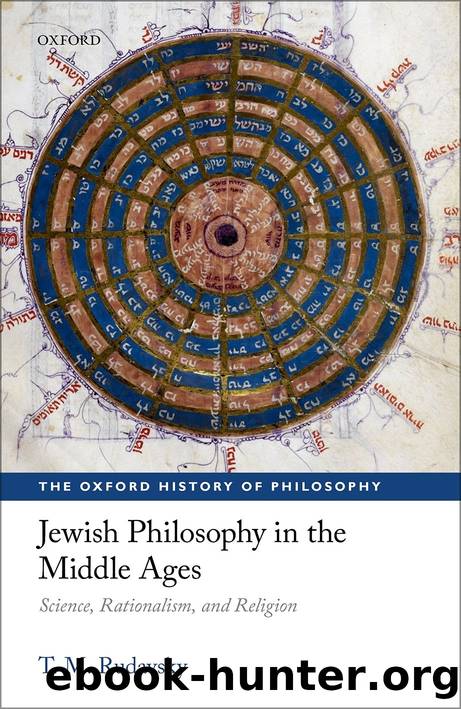Jewish Philosophy in the Middle Ages: Science, Rationalism, and Religion by T. M. Rudavsky;

Author:T. M. Rudavsky; [Rudavsky, T. M.]
Language: eng
Format: epub
ISBN: 9780192557667
Publisher: OxfordUP
Published: 2018-06-29T00:00:00+00:00
VI Aristotelian Models of Creation: Maimonides, Gersonides, and Crescas
We turn now to those views of creation and time that are most influenced by the Aristotelian corpus. Maimonides, Gersonides, and Crescas all present theories that reflect a clear peripatetic influence, either supportive or critical of Aristotleâs views. And yet all three thinkers are writing in the context of Genesis, and so the question is how to reconcile Aristotelian and Neoplatonic science with Scripture. Is it possible to adopt âpiecesâ of Aristotelian cosmology and ontology without jeopardizing basic Judaic beliefs? We turn now to this set of topics.
Maimonidesâ theory of creation is presented in Guide 2.13â30. In Guide 2.13, Maimonides describes three opinions on creation, and then in Guide 2.32 he describes three opinions on prophecy, stating that âthe opinions of people concerning prophecy are like their opinions concerning the eternity of the world or its creation in time.â129 Is the word âlikeâ supposed to posit a one-to-one correspondence between the two sets of opinions? If so, can Maimonidesâ own position be linked with any one set of correspondences, or is his allegiance split? In answer to these questions, interpreters have suggested every possible combination of opinions, and have offered every possible strategy for determining which is Maimonidesâ own view.130 In this chapter, I shall not enter the Maimonidean taxonomy controversy per se. My main concern, rather, is to elucidate the theory of temporality that evolves out of his discussion of creation. I shall, in the course of my discussion, however, offer evidence from Maimonidesâ discussion of temporality to support the contention that Maimonidesâ doctrine of the creation of the world incorporates important elements of Aristotelian eternity. In arguing thus, I clearly align myself with scholars who see in the Guide an esoteric text addressed to the intellectual elite. My own interpretation is that Maimonides recognizes internal difficulties with the view of Scripture having to do with issues of time, but that in the absence of definitive demonstrative argument in support of Aristotle, he is forced to an epistemological stance that incorporates both Platonic and Aristotelian elements.
In Guide 2.13 Maimonides states the three standard views on creation. The main features of these three views, characterized as the Law of Moses (Scriptural), Platonic, and Aristotelian, can be summarized as follows:
5.1âThe Scriptural view: that the universe was brought into existence by God after âhaving been purely and absolutely nonexistentâ; through his will and his volition, God brought into âexistence out of nothing all the beings as they are, time itself being one of the created thingsâ;131
5.2âThe Platonic view: that inasmuch as even God cannot create matter and form out of absolute nonexistence (since this constitutes an ontological impossibility and so does not impute impotence to God), there âexists a certain matter that is eternal as the deity is eternalâ¦He is the cause of its existenceâ¦and that He creates in it whatever he wishes.â132
5.3âThe Aristotelian view: that matter cannot be created from absolute nonexistence, concluding that the heaven is not subject to generation/corruption and that âtime and motion are perpetual and everlasting and not subject to generation and passing-away.
Download
This site does not store any files on its server. We only index and link to content provided by other sites. Please contact the content providers to delete copyright contents if any and email us, we'll remove relevant links or contents immediately.
The remains of the day by Kazuo Ishiguro(8352)
Tools of Titans by Timothy Ferriss(7766)
Giovanni's Room by James Baldwin(6777)
The Black Swan by Nassim Nicholas Taleb(6737)
Inner Engineering: A Yogi's Guide to Joy by Sadhguru(6422)
The Way of Zen by Alan W. Watts(6269)
Asking the Right Questions: A Guide to Critical Thinking by M. Neil Browne & Stuart M. Keeley(5337)
The Power of Now: A Guide to Spiritual Enlightenment by Eckhart Tolle(5309)
The Six Wives Of Henry VIII (WOMEN IN HISTORY) by Fraser Antonia(5209)
Astrophysics for People in a Hurry by Neil DeGrasse Tyson(4988)
12 Rules for Life by Jordan B. Peterson(4154)
Housekeeping by Marilynne Robinson(4040)
The Ethical Slut by Janet W. Hardy(4020)
Skin in the Game by Nassim Nicholas Taleb(3954)
Double Down (Diary of a Wimpy Kid Book 11) by Jeff Kinney(3900)
Ikigai by Héctor García & Francesc Miralles(3852)
The Art of Happiness by The Dalai Lama(3833)
Skin in the Game: Hidden Asymmetries in Daily Life by Nassim Nicholas Taleb(3712)
Walking by Henry David Thoreau(3670)
